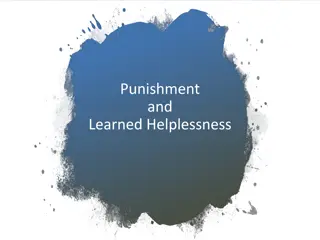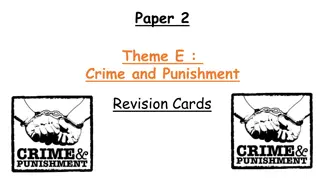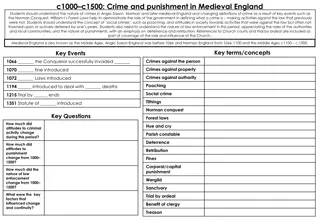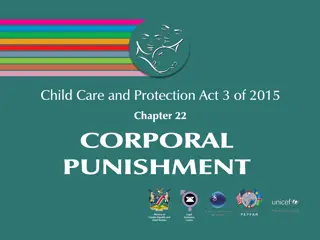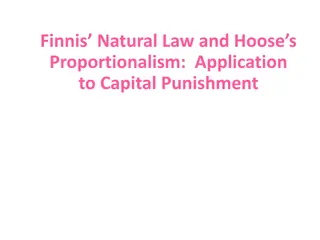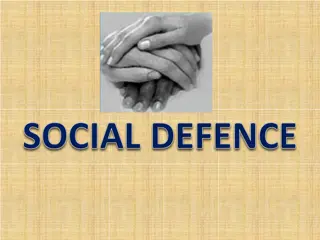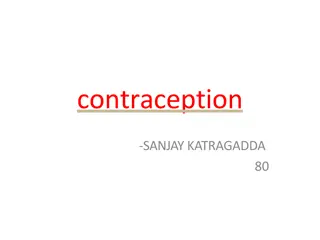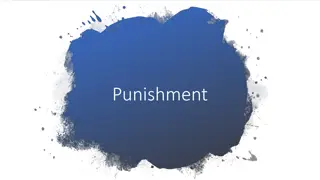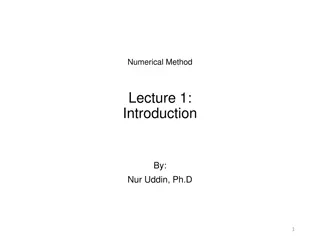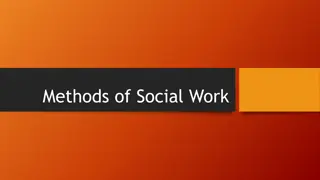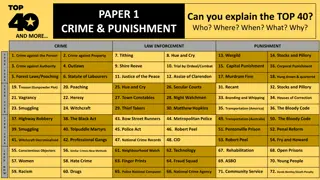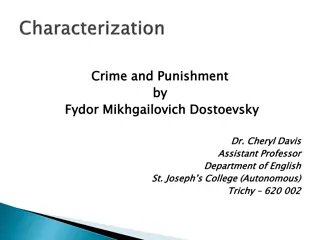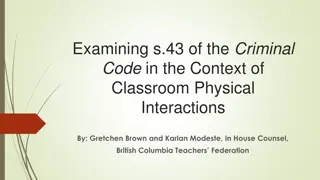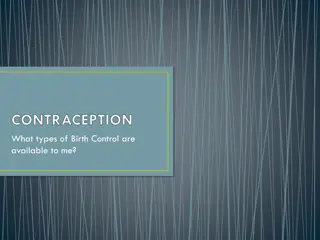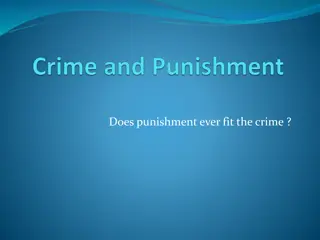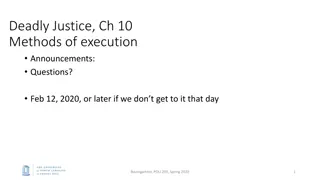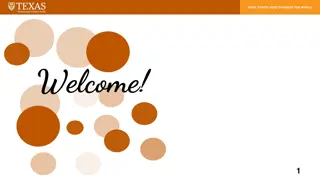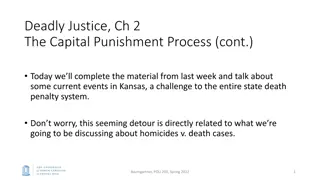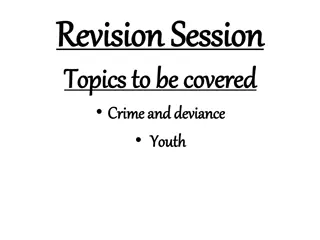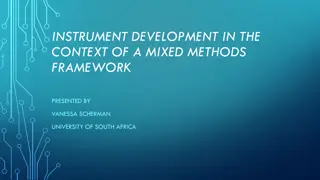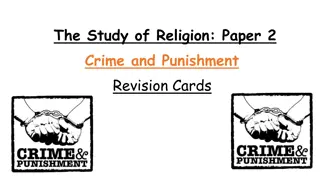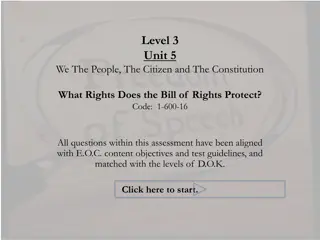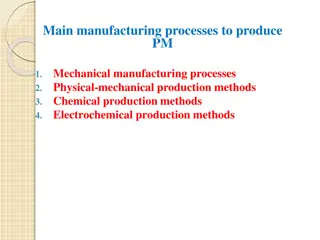INTRO TO FBA
Explore the foundational principles of Applied Behavior Analysis (ABA) through the lens of behaviorism, beginning with B.F. Skinner's theories on observable behavior. Learn about positive reinforcement, negative reinforcement, positive punishment, and negative punishment, and how these concepts shap
4 views • 45 slides
Extension Teaching Methods
Extension teaching methods play a crucial role in facilitating communication and knowledge transfer between rural communities and extension workers. These methods aim to engage, stimulate, and guide learners through the process of acquiring new skills and knowledge. Centurion University in India emp
4 views • 8 slides
Understanding Punishment and Learned Helplessness in Behavioral Science
Learning from the consequences that result in pain or discomfort is essential in shaping behavior. Punishment teaches individuals to avoid actions that lead to harm. Different types of punishment, positive and negative, affect behavior differently based on the presence or absence of certain stimuli.
3 views • 48 slides
Understanding Crime and Punishment: Insights from Christian and Muslim Perspectives
Exploring the concepts of crime and punishment from Christian and Muslim viewpoints, this text delves into the nature of evil, reasons for criminal behavior, and approaches to sentencing. It highlights the importance of intentions, societal influence, and religious beliefs in guiding actions and con
0 views • 9 slides
Dante's Inferno Canto 17 Summary and Analysis
Located in the seventh circle of hell, Canto 17 marks the journey's last leg through the sins of violence before descending into the circles reserved for the worst sinners. Dante and Virgil encounter Geryon, a monstrous beast symbolizing fraud. The sinners, usurers, endure eternal torment by sitting
0 views • 6 slides
Evolution of Crime and Punishment in Medieval and Early Modern England
Explore the evolution of crime and punishment in Medieval and Early Modern England, tracing changes in definitions of crime, law enforcement methods, and societal attitudes. From Norman Forest Laws to the Gunpowder Plot and witch-hunts, discover key events and concepts shaping criminal justice over
0 views • 5 slides
Overview of Semi-Empirical Methods Based on Hartree-Fock
Semi-empirical methods derived from Hartree-Fock theory aim to reduce computational effort by approximating or eliminating electron repulsion integrals. Strategies include introducing adjustable parameters to replace ERI calculations and utilizing zero differential overlap methods like CNDO, INDO, N
1 views • 11 slides
Methods of Punishment in Welsh History: Impact and Reflection
Explore the historical developments in crime and punishment in Wales from the 1500s to the present day, focusing on methods of punishment and key figures such as John Howard, Dic Penderyn, Chartist leaders, and the Rebecca Riots. Delve into the impact of John Howard's campaign, the circumstances sur
0 views • 11 slides
The Rise of Hitler: Establishing the Nazi Police State in Germany
This content chronicles the key events leading to Hitler's rise to power in Germany, focusing on the establishment of the Nazi Police State through propaganda, surveillance, and punishment. It discusses Hitler's use of violence, propaganda, and speeches to solidify his control. The effectiveness and
0 views • 9 slides
Understanding the Child Care and Protection Act: Corporal Punishment in Namibia
The Child Care and Protection Act in Namibia prohibits corporal punishment and emphasizes respect for children's rights and dignity. It outlines forms of corporal punishment, constitutional and international frameworks supporting human dignity, and the importance of promoting alternatives to physica
0 views • 19 slides
Crime and Punishment in Anglo-Saxon Times
Life in Anglo-Saxon Britain (410-1066CE) involved small village living, limited urbanization, community policing, and unique forms of justice like trials by ordeal and weregild fines for crimes. The system was decentralized, with neighbors and tithings responsible for law enforcement and punishment
0 views • 8 slides
Debate on Capital Punishment: Perspectives and Controversies
Explore the debate surrounding capital punishment, also known as the death penalty. Discover arguments for and against this practice, considerations of human rights, and a look at countries that still allow capital punishment. Reflect on the ethical implications and the value of human life in the co
0 views • 20 slides
Understanding Social Defence in Society
Social defence encompasses the protection, care, and support of marginalized groups through strategic efforts by both the Government and Civil Society. It aims at neutralizing offenders through removal, segregation, or remedial methods, focusing on crime prevention and societal well-being rather tha
0 views • 14 slides
Understanding Contraception: Methods, Importance, and Considerations
Contraception refers to methods used to prevent unwanted pregnancies, regulate pregnancy timing, and spacing between pregnancies. It is essential for women's reproductive health and can include barrier methods, hormonal methods, emergency contraception, and intrauterine devices. These methods are sa
3 views • 28 slides
Understanding Punishment in Operant Behavior
Aversive stimuli can influence operant behavior through noncontingent punishment, as seen in conditioned emotional responses like conditioned suppression. The threat of upcoming aversive events can reduce responding, highlighting the importance of conditioned emotional responses. Punishment operates
0 views • 27 slides
Introduction to Numerical Methods: A Comprehensive Overview
Numerical methods play a crucial role in solving mathematical problems efficiently through arithmetic operations. This lecture by Dr. Nur Uddin covers the fundamental concepts of numerical methods, emphasizing their importance in engineering problem-solving with the use of modern digital computers.
1 views • 17 slides
Understanding Methods of Social Work
Methods of social work encompass various approaches aimed at enhancing social functioning and addressing problems in individuals and communities. These methods are categorized into primary and secondary methods, each serving different purposes in the field. Primary methods involve direct interaction
0 views • 20 slides
Promoting Non-Violence in Education: Strategies and Importance
In the National Curriculum Framework of 2005, emphasis is placed on integrating peace education throughout all aspects of school life. This includes using child-centered teaching methods, understanding child psychology, opposing all forms of punishment, appointing deserving teachers, and establishin
0 views • 10 slides
Overview of Crime, Law Enforcement, and Punishment Through History
Explore the evolution of crime, law enforcement, and punishment from ancient times to modern eras. From crime against the person to witchcraft laws and the establishment of modern police forces, delve into significant events and practices that shaped law and order systems. The content highlights var
0 views • 5 slides
Character Analysis in "Crime and Punishment" by Fyodor Dostoevsky
Delve into the complex characters of Fyodor Dostoevsky's novel "Crime and Punishment," including the protagonist Raskolnikov, the depraved Svidrigailov, the daughter of Katerina Ivanovna, the painter Nikolai, Raskolnikov's friend Razumikhin, and the junior police official. Explore their inner confli
2 views • 20 slides
Evolution of Punishment: From Brutality to Modern Criminal Justice System
Punishment for crime has evolved over time from brutal public spectacles to more civilized forms of discipline in modern society, reflecting changes in ruling class interests. The Criminal Justice System (CJS) focuses on deterrence, public protection, retribution, and rehabilitation. There has been
1 views • 25 slides
Understanding Moving Averages and Exponential Smoothing Methods
Forecasting methods like moving averages and exponential smoothing are essential for analyzing time series data. Averaging methods involve equally weighted observations, while exponential smoothing methods assign unequal weights that decay exponentially. Both methods can be useful for forecasting in
0 views • 18 slides
Examining Section 43 of the Criminal Code: The Debate on Corporal Punishment in Schools
Section 43 of the Criminal Code, known as the "Spanking Law," justifies the use of force for correction by teachers, parents, or guardians towards children under their care. This provision has historical roots and has sparked debates on corporal punishment in schools globally. The article explores t
2 views • 43 slides
Types of Birth Control Methods and Their Effectiveness
Explore the different types of birth control available, including abstinence, hormonal methods, barrier methods, and permanent methods. Learn about the effectiveness rates, how they work, and their pros and cons to make an informed decision about contraception. From hormonal options like pills, patc
0 views • 23 slides
Reflections on Punishment and Justice: A Philosophical Inquiry
Delving into the intersection of punishment, morality, and justice, this thought-provoking exploration questions the concept of proportionate punishment for crimes committed. It challenges conventional notions of retributive justice and poses ethical dilemmas related to the effectiveness of the crim
0 views • 8 slides
Evolution of Execution Methods in Modern Society
Explore the historical and modern methods of execution, from hanging to lethal injection, and the transition towards more civilized approaches. Learn about the contributions of prominent figures like Elbridge Gerry in advocating for humane execution methods. Delve into the commercial rivalry between
0 views • 13 slides
The Debate Over Lethal Injections in Capital Punishment
Lethal injections have become a controversial method of capital punishment, with the debate focusing on their legality, ethics, and effectiveness. Over the years, the drugs used in lethal injections have changed due to drug shortages, leading to concerns about botched executions and prolonged suffer
0 views • 12 slides
Positive Discipline Strategies for Building a Strong Parent-Child Relationship
Developing a positive relationship with your child is crucial for effective discipline. It involves catching them being good, setting clear expectations, childproofing the environment, and using positive reinforcement rather than physical punishment. Understanding the difference between discipline a
0 views • 22 slides
Solving Systems of Equations: New Methods and Applications
The content discusses various methods for solving systems of equations, including substitution and elimination methods. It presents real-world problems involving money, sales figures, and fishing competitions to demonstrate the application of these methods. Readers will learn how to apply these tech
0 views • 10 slides
Insights into Life in Ancient Rome: Excavations, Pompeii, and Roman Society
Explore the fascinating world of Ancient Rome with a focus on excavations at Pompeii and Herculaneum revealing insights into daily life, patrician families, and archaeological methods. Uncover the impact of ancient Roman actions and achievements on Europe and the wider world, and delve into the patt
0 views • 36 slides
Procedural Decomposition and Static Methods in Programming
Understanding procedural decomposition and static methods is essential in programming to reduce redundancy, organize code effectively, and manage complexity. Procedural decomposition involves dividing a problem into methods, while static methods help in code reuse and managing complexity. By designi
0 views • 18 slides
Exploring Crime and Punishment: The Stanley Tookie Williams Case Study
Dive into the topic of crime and punishment through the compelling case study of Stanley Tookie Williams, co-founder of the Los Angeles Crips gang. Analyze the controversial use of the death penalty, explore the concept of rehabilitation on death row, and consider the complexities of justice and mer
0 views • 12 slides
The Capital Punishment Process: Aggravators, Mitigators, and Post-Conviction Appeals
The continuation of the discussion on the capital punishment process, specifically focusing on the bifurcated trial, the consideration of aggravators and mitigators, post-conviction appeals including direct appeal and Habeas Corpus appeals, and the importance of proportionality review in state supre
0 views • 25 slides
Understanding Crime and Deviance: Control, Solutions, and Measurement
Exploring the concepts of crime and deviance, this content delves into various aspects such as types of deviance, agents of social control, solutions to crime, the penal system, methods of punishment, and measurement of crime through victim surveys and self-reported studies. It highlights the comple
0 views • 43 slides
Instrument Development in Mixed Methods Framework by Vanessa Scherman
Mixed methods research presented by Vanessa Scherman from the University of South Africa explores the development of instruments within a mixed methods framework. The content covers an overview of mixed methods, methodological norms, instrumental development, and closing the loop. It discusses the i
0 views • 40 slides
Exploring Crime and Punishment in Religion: Key Insights and Perspectives
Delve into the study of crime and punishment within the framework of religion, examining perspectives from Christianity and Islam. Understand the concept of evil, the reasons behind criminal behavior, and the nuances of sentencing based on religious beliefs. Explore how mental illness, poverty, upbr
0 views • 9 slides
Understanding Rights and Protections in the Constitution
Explore key concepts related to the Bill of Rights, including definitions of capital punishment, cruel and unusual punishment, and double jeopardy. Test your knowledge on constitutional rights and legal principles in this interactive assessment.
0 views • 77 slides
Understanding the Aims of Punishment and Evaluating Deterrence as an Effective Aim
Explore the aims of punishment and the reasons behind punishing criminals in different ways through a series of tasks. Match descriptions to aims, identify and explain key aims of punishment, and evaluate the effectiveness of deterrence as a primary aim. Provide reasoned arguments, consider religiou
0 views • 4 slides
Understanding Deviance and Social Control in Society
Exploring deviant behavior through different lenses such as historical, cross-cultural, and situational deviance. Delving into the mechanisms of social control by formal and informal agents like government, police, and peer pressure. Understanding the functions and methods of punishment within the p
0 views • 24 slides
Main Manufacturing Processes to Produce PM - Mechanical, Chemical, Electrochemical
The process of producing PM involves various manufacturing processes such as mechanical grinding and milling, physical-mechanical production methods, chemical production methods, and electrochemical production methods. Mechanical processes include grinding and milling using jaw crushers, hammer grin
0 views • 12 slides


